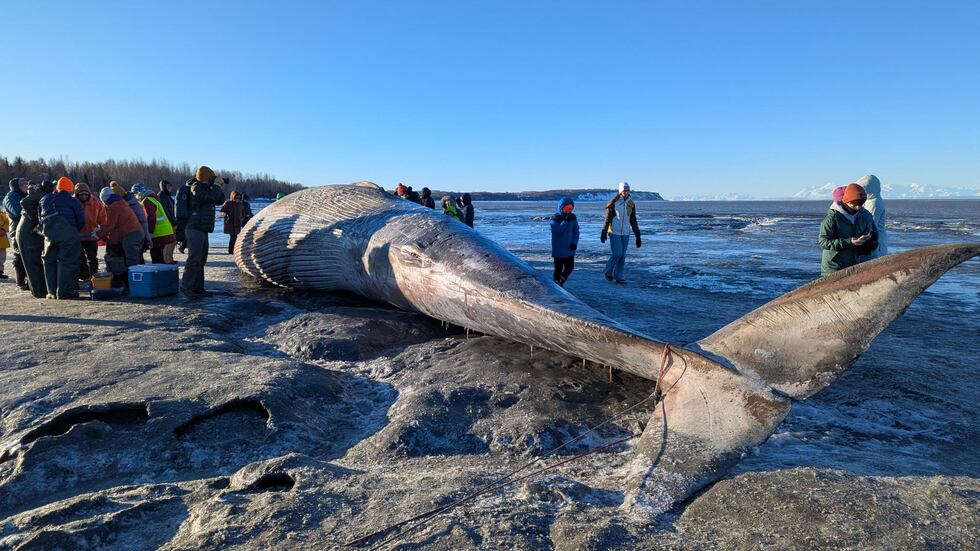ANCHORAGE, Alaska (KTUU/Gray News) – A fin whale washed up on a beach in Alaska over the weekend.
The nearly 50-foot-long, dead whale was found near the Tony Knowles Coastal Trail in West Anchorage, according to National Oceanic Atmospheric Administration biologists. It was reported to the Alaska Stranding Network late Saturday night.
NOAA biologists and members of the Alaska Veterinary Pathology Services went out to the site on Sunday to collect data samples.
“That’s pretty unusual for [a fin whale to be] that far up in the inlet, and Anchorage to be seeing an animal that large, and especially this time of year,” said Mandy Keogh, NOAA’s Alaska Regional Stranding Coordinator.
Barbara Mahoney, a biologist with NOAA Fisheries, was at the site of the beached whale on Monday and said the whale is a “very young” female.
“Today, we’re out to collect additional samples,” Mahoney said. “If possible, we’ll try to cut into the belly of the fin whale and see if we can get some organs. The idea is to determine the health of the animal, determine if there is a cause of death. It probably will be challenging to get the cause of death.”
The whale, which is an endangered animal, measures about 47 feet long. Mahoney said it’s been tough to collect samples due to the whale carcass being mostly frozen.
“They have stranded here in the past,” she said, “but it’s not a common occurrence. And to be honest, having stranded animals like this in November — this might be the first for me, and I’ve been here a long time.”

Fin whales are found in the Gulf of Alaska and the Bering Sea, and have also been well-documented in the Lower Cook Inlet, according to NOAA.
Mahoney said she thinks it may be upwards of a year before results come back from the necropsy. She thinks that the young whale was healthy but died and floated to the beach near the coastal trail.
“We’ll have some testing done, and it will take within a couple of months, and some will be more long-term, depending on what’s found out,” Mahoney said. “Within a year, we should have some results back from this animal, but some of that will be within a few months.”
Biologists anchored the whale to the beach so that it would not float away as they collected samples. Mahoney said that once the collection process is finished, the whale will be untethered and able to float back into the ocean.
As researchers work on the carcass, residents have been taking the opportunity to walk across the frozen mudflats and see the beached whale. Families, fat-tire bikers, and dog walkers all flocked to the site on Sunday and Monday.
NOAA said it’s fine to explore, but the agency asks that people do not collect any parts from the whale. Anyone who chooses to defy that recommendation or the guidance laid out by the Endangered Species Act could be doing something illegal.
If you see a stranded or entangled marine mammal, please reach out to NOAA directly at (877) 925-7773.
Copyright 2024 KTUU via Gray Local Media, Inc. All rights reserved.